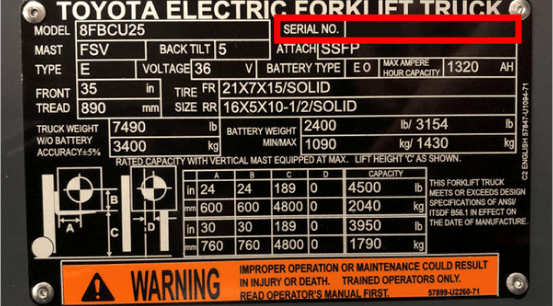Forklift Fuel Consumption & Efficiency

Increasing your business profits involves controlling costs and optimizing operations. Limiting forklift fuel consumption is one change to help reduce costs. Internal combustion forklifts consume approximately 6 lbs. of LPG per hour. However, many factors can contribute to how efficiently your forklift uses fuel.
Operator Training
Just like driver behaviors can affect automobile fuel consumption, improper forklift operation can lead to decreased fuel efficiency. As a part of the operator training required by OSHA, operators should be instructed on best practices for balancing productivity and fuel efficiency. Best practices include common-sense solutions such as shutting off the forklift when it is not in operation or gradual acceleration instead of “gunning” the engine. Should a particular lift show signs of excessive fuel consumption, more in-depth tracking by shift and operator may be necessary to identify and rectify causes.

Maintenance
Proper maintenance is necessary for the forklift’s effective operation. Planned maintenance options can contribute to a more fuel-efficient and cost-effective organization. Providing quality fuel and proper maintenance of items, such as tires, that experience wear and tear from normal operation is key for minimizing fuel consumption. Damaged tires can cause harder driving and demand more from the forklift engine, decreasing fuel efficiency.
The size of the forklift and the work being done can also affect fuel consumption rates. If you have no record of the average fuel cost per unit in your operation, you can conduct a driving test to establish base average costs per unit. To complete a driving test:

- Instruct operators to log hour meter readings anytime a fuel tank is replaced.
- The start and finish readings should be recorded to the tenths digit and the log should be housed onboard the forklift for convenience.
To calculate the average fuel cost per hour per unit in your forklift fleet:
- Multiply the price per gallon of (fuel * the number of gallons) in the tank
- Divide the above result by the number of hours your fuel tank was in operation
For example:
- Cost Per Gallon: $2.00
- Cost per LP Tank: $14.00
- Start Hour Meter Reading: 600
- End Hour Meter Reading: 625
- Difference: 25
- Cost per LP Tank / Hours of Use: $14 / 25 hours
- Fuel Cost per Hour per Unit: $0.56
Facilities Observation and Optimization
Your fuel consumption can also be affected by your facility’s configuration. Layout, racking heights, and forklift routes can all contribute to longer distances and higher fuel consumption. Conduct an audit to determine whether your facility is the cause of high fuel costs by walking through the warehouse. Pay special attention to high traffic areas and key destinations like drop-off points, parking, and high throughput storage. Your operators can be key contributors to this audit – ask for their feedback on daily challenges in the operation and for them to identify possible solutions to improve efficiency. Consider making time in your operations to test alternate routes to determine what is most efficient for your business.
Request A Quote or for pricing, parts & more, click here to find a dealer near you.


